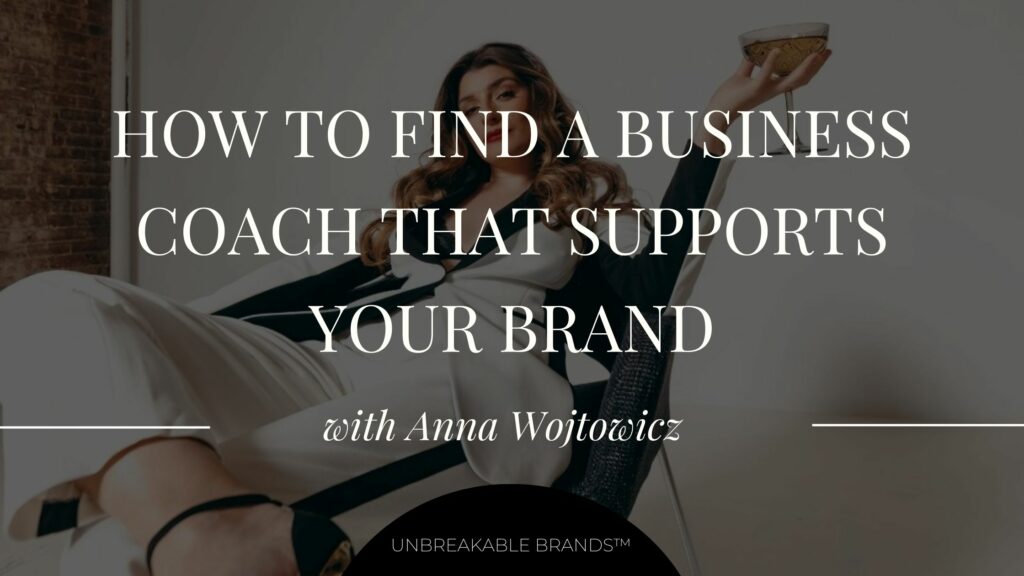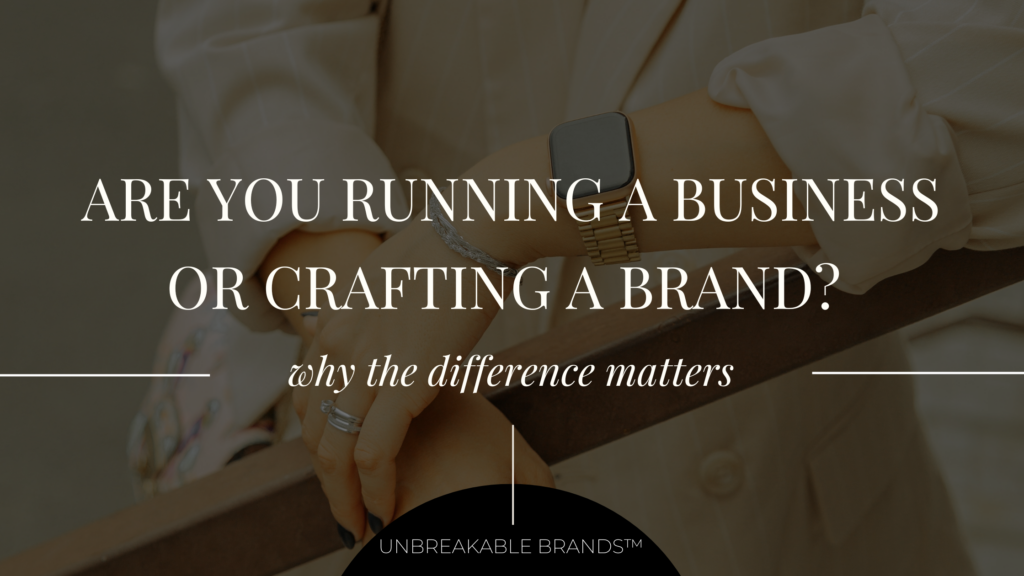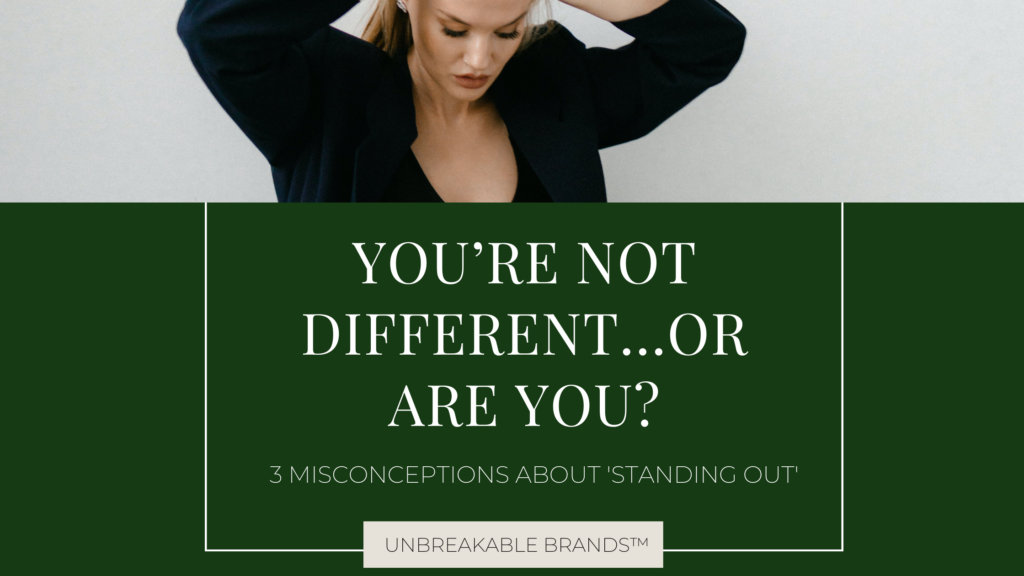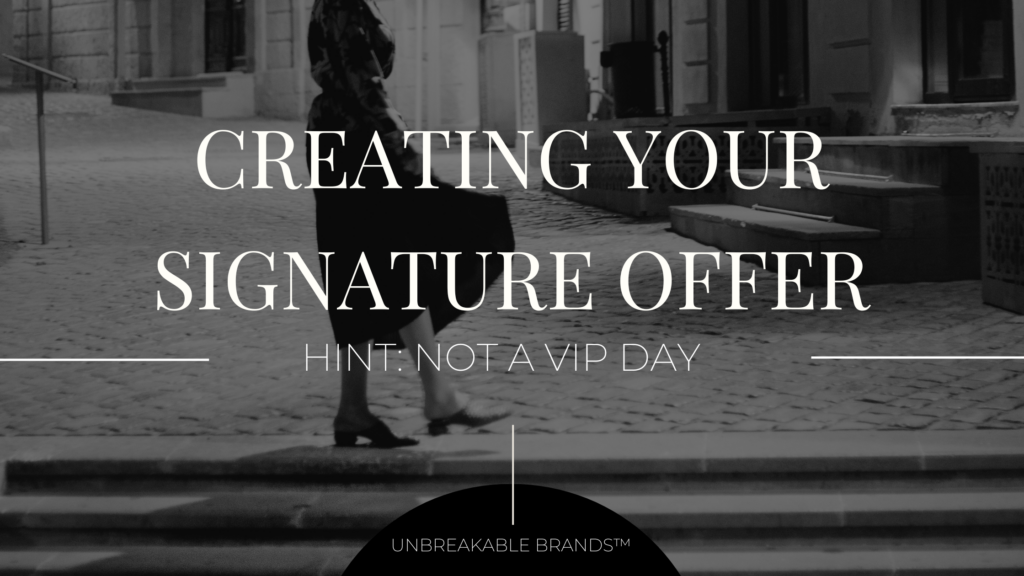I am literally so pumped for this conversation today with Anna Wojtowicz, an incredible business strategist and coach. We are talking about red flags when looking for a business coach who actually supports your brand growth and the shifts in your decision-making that need to be happening while working with a business coach.
Anna is the founder of The AW Creative, a business strategy firm for ambitious female founders ready to start and scale legacy & impact brands. Today she will be talking about ways to find a business coach that supports your brand and avoid getting burned if at all possible.
Anna, welcome!
If all we are focused on is money, then we are generating, not building.
– Anna Wojtowicz, Business Strategist
Here’s what you can expect to hear in this episode:
- Anna’s background and what she vitally brings to the table as a strategist is so vital
- The most common mistake entrepreneurs make when it comes to their brand
- What Anna offers to coaching clients that helps them before they jump into branding
- 5 key indicators that a business coach will support your brand growth
- How building her business coach brand with me contributes to her success
- How Anna continues to monitor her brand’s evolution
Resources Mentioned In
This Episode
Take The Brand Quiz To Unearth Your brand personality
Pop over to our brand and web design agency and take the free brand personality quiz to begin diving into your brand persona.
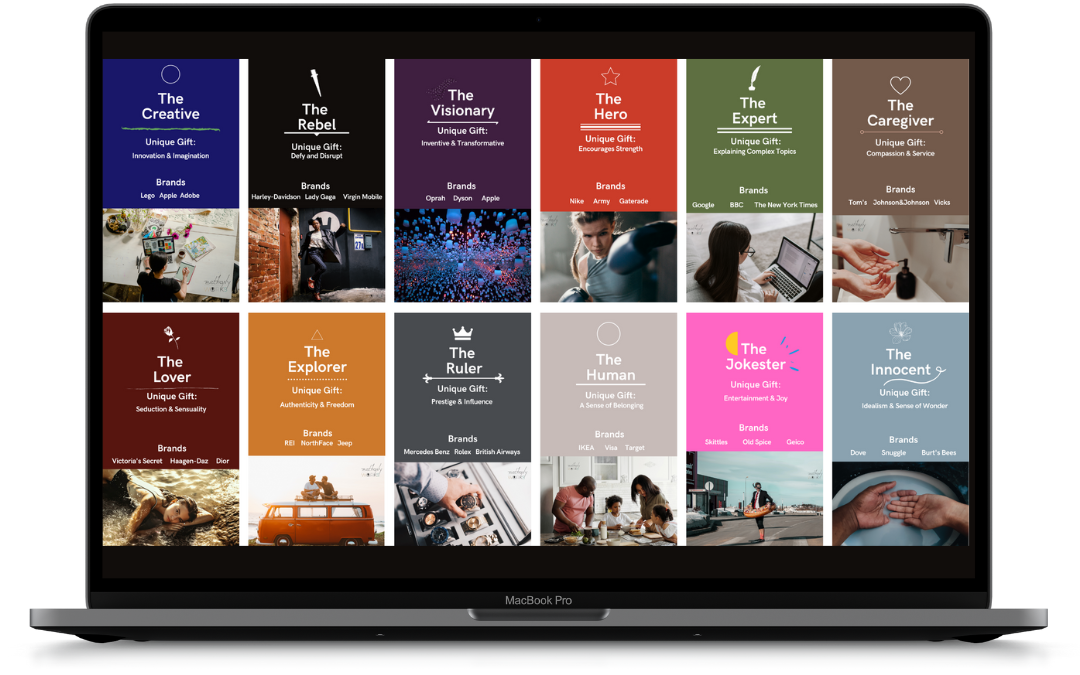
I think your background and what you bring to the table as a strategist is so vital (it’s one of the reasons I have hired you myself) – could you share how you got to where you are today?
I feel like my background is really different than most online. First of all, I actually went to school for marketing. So I’ve been doing this for over a decade, which you don’t typically see in the online space.
Just to go back in time, I studied advertising and marketing here in New York City. And then, through that, I had different marketing internships, brands like Teen Vogue, Vogue, and Bravo.
And then, after college, I worked in the marketing departments at brands like Martha Stewart Magazine, the Smithsonian Magazine, and then Paperless Post for their digital marketing side of the business. I have a lot of experience with working with clients executing their marketing vision; for example, at the magazines I worked with, we worked with a lot of really big advertisers on executing their digital marketing campaigns with us. And then, when I was in Paperless Post, I was the in-house Digital Marketing Manager. So I have both sides of the coin there.
And then the pandemic hit. And marketing is always the first department to go because we like to spend money and people don’t like that. So the pandemic hit. And that’s where I was really unhappy, not with the pandemic, necessarily; obviously, that was awful. But I was really just unfulfilled in my life at that point.
It’s kind of like, I climbed the mountain to where I wanted to climb the mountain to, and I got up there and was like, “I really hate it up here. I don’t want to be on this mountain anymore.” So I was having an existential crisis.
And then, honestly, when I got let go, I was like, “Oh, thank God,” because I was so miserable at that point. I’d rather literally be unemployed than spend one more day at a job that literally feels soul-crushing. And I didn’t even have stability because, hello, I got let go, so corporate is not stable. So I spent a couple of months – I like moved back home; I humbly moved back home at the age of 29.
And I really took a couple of months to really think about what did I want to do? Like, what did I want my 30s to look like? What made me happy?
And honestly, I was like, why don’t I just try like giving my own business a go? I mean, like, Lord knows I’ve been doing this for long enough, like, worst case, it doesn’t work out. And I go back to corporate once things settled down with the pandemic. So that’s just kind of how I began was like really having that conversation with myself. And that’s how The AW Creative was born.
And since then, in the two years that I’ve been in business, it’s just been amazing because I’ve met so many amazing women who also have the same brand, like brand identity and values as I do like you. And it’s just so amazing that I’ve been able to help so many businesses scale impact brands. So that’s kind of like where I went from that.
And when I started, the immediate thing I noticed in the online space is a lot of people just teach from their own experience because they’re like, “Oh, I did this on my own. Now I’m gonna show you” which is great, that’s like, amazing that you are able to, like build this business, like by your own knowledge I like so applaud that.
I mean, I built my business with my own knowledge. But I also have the knowledge of how actual legacy brands are built, how they function and how they market, and how these mega billion-dollar brands function. And I think that is so important because, in the online space, people just are very small. And I’m talking about, like, even if you’re like seven figures, like you can act very small, and you’re not actually thinking holistically. And that’s the problem that I see.
I fill that gap of, like, just because you’re starting and maybe you’re only a 5k or 10k or even like 20 or 30k like there’s so much more potential than just building an Instagram business. The people that I work with want to build actual companies like that’s just who I serve, and that’s who my clients are. So there’s just like that more holistic micro-to-macro approach that I take with all of my clients.
I like to say that I’m not a prescription coach. So I’m not someone who’s like, you told me “Oh, I want to make more money. I want to hit 10k, 20k.” And my first initial thing out of my mouth is like, do you like group programs? Hosted masterclass?
Like that’s not, I’m absolutely like, so against that, not that those things are bad, but like they’re not a prescription or solution to everything. Like there’s a bigger conversation that needs to be had, because if we’re not actually examined, examining the holistic machine that is your business, that is your brand, that is your lifestyle, and your long-term vision, then we’re just generating and we’re not building.
What is the most common mistake your entrepreneurs make when it comes to their brand, from the perspective of a business coach?
From my perspective, what I see as the most common mistake being is one is that building a brand is everyone’s blind spot. If you do not have a formal education in the space like I do, then you don’t know anything about it. How would you? You weren’t educated on it.
So there’s definitely a lack of that awareness and education just because it’s not like you didn’t go to school for it, you weren’t around it, you didn’t work in the industry, you’re self-taught, and that’s totally okay. So just knowing this might be a blind spot of mine, and I need to do something about it.
And then number two is they think that they need a website copy, or photo shoot, but they don’t realize that’s all tied into branding. They think they can just do it separately instead of doing it as an order of operations. And that’s actually where I see people having investment burnout because they’re like, “Oh, I did this photoshoot and it was so much money” and then like nothing really came out of it.
Or I did – I paid this like copywriter 1000s of dollars for website copy, and I didn’t see any conversions out of it. I’m like, “Well, that’s because, like, you think that they live in silos when those things that you’re paying for are investments that need to be in an order of operations in order to maximize ROI and efficiency.” And that actually will prevent investment burnout because you’ll actually start seeing an ROI.
I actually had that conversation this morning on a one-on-one call with a client. She’s a copywriter, and she’s like, “Oh, I’m getting my photo shoot, like next month,” and I was like, “Okay, is that photoshoot going to be just like an intermediary photo shoot, or is that going to be like your big photo shoot?”
She’s like, “No, I want it to be the big photo shoot.” I’m like, “Maybe we should push that back. Because I feel like we really need a brand strategy before we do that.” And she’s like, “Oh, really?” And I was like, “Yes, let’s reverse here a little bit.” And so then I had to educate her, and like, that’s totally fine. People understanding that these things work and like an order of operations, like a machine, will maximize their ROI.
Another thing is thinking that posting with templates and just having like a color scheme is enough to be like, I’m building a company. But if we logically think about that, will that take you to retirement? Like, are you going to be 45 years old in Canada? I know; I don’t want to be, absolutely not. If I’m 45. And on Instagram, I’m like, oh, my God.
But that needs to be really rooted in the brand identity, the values, the mission, the goal, what we are serving as our North Star, as the brand evolves, instead of just being like, let me just throw some shit into Canva. And, like, call it a day, there’s actually a bigger vision or a bigger strategy behind it. And also, having like that brand strategy will help you drastically scale because as you start onboarding people, you can just send them the brand strategy guide.
And you don’t have that messiness of like, “Wait, what are we doing? What’s my role?” It’s just very clear, as you scale that like, “Okay, this is the brand, this is the brand strategy. These are the visuals holistically, just like they make sense.” If you’re ever wanting to scale, which most people are.
What do you offer your coaching clients that would help them before they jump into branding?
Usually, around like 10k months is when I started recommending it because I feel like once you hit five figures and you’re consistent with it, you’re in a place where one, financially just is more feasible. And two, you’re usually more of like, okay, I know what I’m doing, I have found a framework that works for me, now I can start playing a little bit, seeing what else is out there, investing in branding, taking the time to do it, that kind of stuff.
But realistically, what’s happening in the back end is we’re really looking at the machine and all its workings and seeing where we need to really solidify those foundations. So that’s usually, like, offerings, pricing, your buyer journey, who you serve, like getting crystal clear on that and making sure that these aren’t just offers and pricing and an audience that you want to scale in the next year. But we’re really solidifying this to be able to scale for the next five to 10 years.
So in the early stages, I see a lot of people just being like, oh, we’ll do a VIP day, I’ll do this, I’ll do that without actually thinking about longevity, we like okay, but is this an offer I want to scale in the long run? Right? Is this a signature program I want to scale in the long run? So we really think about more of like, the long-term vision around that.
And then we also think about what is your five to 10 years down the road. Because that’s also going to impact your branding. We need to know what are we building towards. Because even if somebody goes to Bethany, they’re like, build me a brand. Even she’s gonna be like, “okay, but what’s the mission?” Right? Like, if you’ve never thought about that, that’s an issue.
So what does your business do other than just sell offers? Because that’s not a brand, like just selling offers and being like, I hope you scale. Okay, that’s the payable one that’s boring, but that’s not actually a mission. Right? So what actually is the purpose of the brand and the company? So we do a lot of that work together. And then that’s when Bethany can really like pour like the gasoline on it and really build and cultivate the brand out.
5 key indicators that a business coach will support your brand growth
I see copy-and-paste coaches a lot. And I remember that conversation we had about how you, it’s actually not a good thing if you can tell who designed five websites. It’s kind of like if you’re a stranger and you can actually pinpoint who designed your website, that’s actually like a bad thing. Because if you’re getting custom branding and a website done, it shouldn’t look like everybody else who you’ve designed. And that’s not actually a good thing.
I feel like with coaches; it’s the same thing. I can look at certain people and know exactly who they’ve worked with based on their business models. And that’s not a good thing either because if you’re just working with someone because you’re like, well, they made money, so the way they structured their business just like must be the right way.
That is like a perfect recipe for disaster, for burnout, for just like not to say that their way of building is wrong but like if they only teach their way or if you just want to learn your way without actually having those deeper conversations like, oh, for longevity sakes, is VIP day good for me. Can we talk that out? If, like, those conversations aren’t happening, and it’s just like copying and pasting, that’s a no-go. I should not be able to tell that like your business model is the same as the person you’re working with. So that’s number one.
If they ask you only money-related questions, oh, my god, immediate red flag. Meaning, if when you’re having the initial conversation with them, or if all they do is just post screenshots of their bank account or screenshots of other people in how much they’re making, that is not marketing. That is not a marketing strategy. That is literally like, I don’t know what the hell that is. But like, that doesn’t exist in the real world. I know that’s social proof.
And trust me, I do it too. But I do it any marketing lens to provide context to a story, but we all know what I’m talking about, because there are some accounts that that’s all they do.
So if the conversation right off the bat, obviously, like, there’s nothing wrong with money goals, we’re not using humanizing money. But money is not the only thing that involves scaling and building a company. If all we’re focused on is money and nothing else then we’re generating, we’re not building, and there’s a big difference. So if the conversation, in the beginning, doesn’t revolve around, what your goals are other than your financial goals? What is your long term? What is your long-term vision? What do you imagine, in 10 years, this evolving into? How do you see your life forming around that? If it’s not like deeper level conversations like that, like run for the hills.
If you’re someone who is like, “Okay, I’m ready to commit to really scaling, multi five figure 15, 20, 30k months,” then the scaling conversation also should not only revolve around money, because making money when it comes to scaling is literally like 10% of the conversation, how you’re actually going to scale is like by doing 90% of like back end work.
I mean, Bethany, you know that because that’s what we did in the mastermind. So the scaling conversation needs to be a lot more about like, “okay if we’re scaling to those months, what do we need to refine? What do we need to optimize? What do we need to expand that has actually nothing to do with offers? Maybe it does, maybe he doesn’t. But 90% of the time, scaling has everything to do with more of refining and restructuring, so we can scale effortlessly to those money goal months while also keeping the integrity of the brand that we’re expanding as well. So that’s like a really big one.
And then if somebody tells you to only keep posting more on Instagram, oh, my god, a red flag, immediate red flag. First of all, posting on Instagram is not a marketing strategy, either. That is a marketing tactic. There is a difference. There are three types of marketing, content marketing, brand marketing, and performance marketing.
Yes, Instagram, posting on Instagram does fit under Content Marketing, but posting on Instagram, that alone is not a strategy. There was a lot of work that goes in the back end to actually creating a content marketing strategy that you can post however you want, but chances are if posting is not working, and just posting more, that’s actually an underlying marketing visibility issue that we need to tackle in like the system of your machine. So yeah, definitely no posting more like that’s not advice you should ever take.
And then the last one would be is that person you’re thinking about hiring, do they even have a brand to begin with? I know that sounds so rudimentary, but do they have a brand, and by a brand, I mean, can you actually see the holistic formulation of what they’re building and creating in multiple different areas of their business? Or is it just look like a unicorn threw up? That’s not a brand. Right?
So if you’re looking to scale and build a brand, and very intentionally, align with someone who has those values, and is already doing it, and actually doing it on a regular basis, because if you hire someone, just because they make a lot of money doesn’t mean they’re actually a right fit for you. That’s not just because somebody makes a lot of money; they could be teaching you a process that just doesn’t work for you.
So really do your due diligence of asking them; this is my current situation, how would you advise for it? I love having those conversations before somebody hires me. You shouldn’t be able to have those conversations with someone to align, because I don’t want to work with someone who’s not a right fit for me. And I don’t want that person to want to work with me just because of how much money I make or what they think I can give them. I want this to be a partnership. And that’s how it could be.
And the saddest ones not technically related to brand. But if somebody is unwilling to have an actual conversation with you, before they sign you if they’re like, I don’t do sales calls, I don’t even want to talk to you, you should just like know that you want to work with me. Run. That is a scam, a Ponzi scheme. I’m sorry, but you’re going to have major investment regret with somebody like that.
How did building your business coach brand with me contribute to your success?
Because I have worked at major brands, to me, that was never a question of building a brand. I just thought that was normal. And then, I got into the online space. I’m like, wait; people aren’t building brands? Because that’s all I saw. So from day one, even when I didn’t know what I was doing, and I was just like figuring it out.
And I didn’t actually invest with you until like, beginning of year two, I think. But like I always knew that was a part of the plan. So something that I always ask myself, was, if I were on stage with like, Forbes 40 under 40, and I’m surrounded with these great startups who just hit an IPO, such amazing woman, if I were to be on that stage and give a presentation. And they all of a sudden introduce me and like, you know, on the screen projected my instagram or my website or my brand, would I be embarrassed? Or would I be proud?
And I think, I mean, I would be proud, and my clients also would be proud, right? So that is something I always keep in mind, like everything I’m doing. Would I actually be proud of this? Branding was never like a nonstarter for me because it was just the way it had to be because I always wanted to be legitimate. I want it to be seen as not just like an Instagram business. I want it to be seen as a company, especially here in New York City.
If I’m going to networking events, or you know, I’m meeting people out, if I give him my business card, when they look me up, I want them to take me seriously. That’s part of it. So that’s more of an internal thing I always like consider.
From a more tangible side. I always was very conscious about the decision that I wanted to build a luxury brand. Now, you can build whatever kind of brand you want. I have clients that all they sell is low ticket offers, but they still have a very amazing brand, so it’s not even if it’s like luxury low ticket. I don’t care what it is; you still need a brand that goes with it.
But for me, I was always very aware that I wanted to build a luxury brand. But if I was building a luxury brand and I clearly didn’t have the evidence of a luxury brand, then that would have been hypocritical. And I always knew that I wanted to scale into high ticket offers, which now I have, and you can’t do that if you don’t actually have a brand that backs that up.
So monetarily, having a luxury brand has definitely allowed me to have offers that are in the multiple five-figure price range. And because of that, I’m able to exhibit white glove service, a similar value. So I’m now attracting these like high caliber clients from that. I’m able to get from my content marketing strategy and my brand marketing strategy that very clearly states just by looking at my brand, I am not someone who’s going to show you lazy girl hacks to success. There’s no like, lucky girl syndrome here.
It’s very much I’m a business strategist for people who holistically want to build very intentional companies. And this is a place where you are actually going to solidify that plan that’s going to take you into retirement, whether you’re starting or you’re scaling. It’s not only for people who are already in the five-figure digits, I work with so many people that are just starting their businesses, but it’s more of the mindset and the values of from even day one wants to work with someone who values the same things I do. So that’s how it’s affected me and what I’ve been able to do with it.
Brand evolution will happen. How do you continue to monitor your brand?
That’s something that I do quarterly; you should definitely at least do it bi-yearly, or at least yearly. But the buck doesn’t stop at, oh, I have a pretty website. Now let me do whatever I want. It doesn’t stop there. Every time I have a product go live, I’m very aware that it needs to be a sub-brand of my brand. Because I’m very aware that I want to build really strong offer awareness.
And I feel like when most people hear offer awareness, they just think like, oh, I go on Instagram and just talk about my offer nonstop. No, that’s not that. Once again, that’s not how marketing works. So part of that brand marketing plus content marketing strategy is actually creating sub-brands within your brand. So if you have like a program that you know, you want to be a signature program and evergreen program, of course, those need its own mini brand of inside of it.
I created a sub-brand for the Limitless Mastermind, I also created a sub-brand for the Limitless Podcast, and they each have their own identities, but that fit under the umbrella of the AW creative. So I don’t necessarily do this for master classes or things like that. But if I know that this is going to be something that I’m going to run continuously, I do put the investment towards it because that is an extension of my brand. And I want the offer awareness to stand by itself aside from like my actual name and brand as it relates to it.
And then also looking at brand values, for example, last month posted on my Instagram that I’m actually discontinuing intensives because at the start of q2, I actually looked at my brand values, and I just decided that the intensives were no longer aligned with the values they initially had set just because I feel that people were starting to use them as like a quick get out of actually committing to long term problems, so solving macro issues in micro containers.
So you pay for an intensive thinking that I’m going to completely help you figure out your foundational blind spots. That’s not how it works. The mastermind is six months for a reason. So instead, I was like, “You know what, like, this is no longer aligned with my values. Does it make me a lot of money? Yeah, but that’s not my only goal here.”
Once again, my mission is not to generate, it’s to build, and I can do that profitably. So instead, I took the intensive off. And now, I offer VIP days, and the VIP days are specifically structured to map out a six-month roadmap in all different categories of your business. That, to me, is more in line with my values and my mission of building longevity in your business. So even though it’s just a VIP day, we’re still working on a part of your business that has more of that longevity mission built into it.
And then, if somebody does really need to talk to me, I do offer a clarity call. I just noticed that the intensives were really being used as a scapegoat. And my principles and values in my business were just like, that’s not fair to me. And that’s also not fair to people wanting to actually get support. So I took that off the table. And yeah, it was a hard decision to make. But at the end of the day, I was just trying to quickly generate some quick cash; where am I actually staying true to my mission and what I’m building in the long run?
One of the major components of the Limitless Mastermind is actually figuring out how to step into that role. Because by yourself, you’re not going to do it. Honestly you’re not going to do it unless you’re pushed to, but also, like, most people just don’t know how to do it, they don’t know how to actually move into that role. And get out of just like the constant doing, because there’s so many moving parts and pieces to it.
Because at that point in your business, when you decide like this is the end game, I’m not just doing this for shits and giggles for a couple of years. And then we’ll see what happens next, like, no, this is how I’m retiring. Maybe I’ll pass this on to my kids, like, that’s the actual goal. Once you have that like shift, then you start getting a lot more serious.
At a certain point, you have to really understand how you decision make, which is also a skill set that you need to develop as a CEO of your company, and that we work on together. It’s that, like, are you even aware of how you are making decisions? Because if you’re not even aware of how you’re making decisions, and once again, that could be an issue of why you’re not scaling or why you’re still stuck in your business.
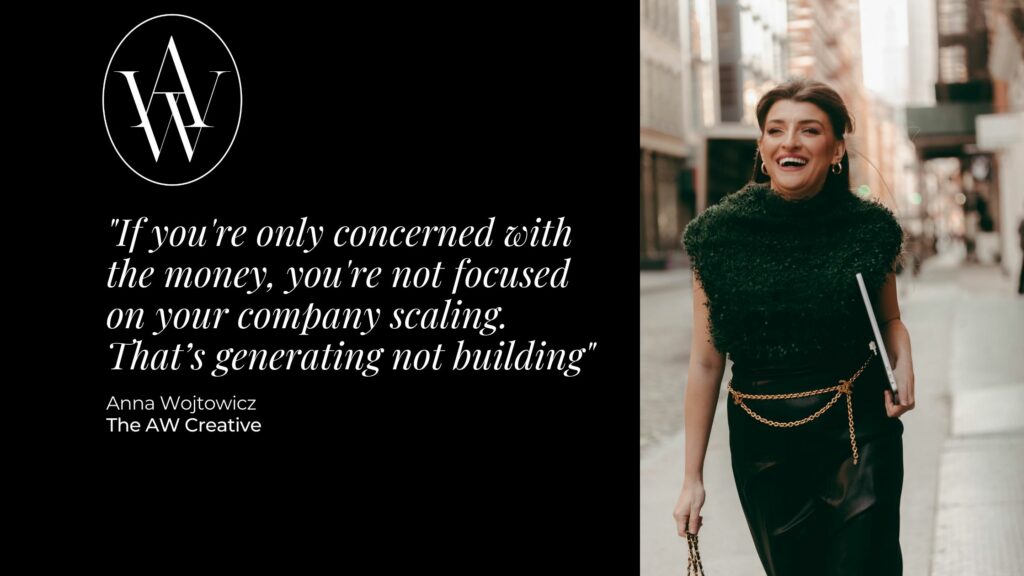
Anna Wojtowicz bio
Anna is the founder of The AW Creative, a business strategy & consulting firm for female founders looking to start and scale impact-driven brands. It’s a community for limitless thinkers and legacy builders who believe that if you can dream it, you can achieve it. The AW Creative includes educational resources, mastermind mentorship, and business consulting.

